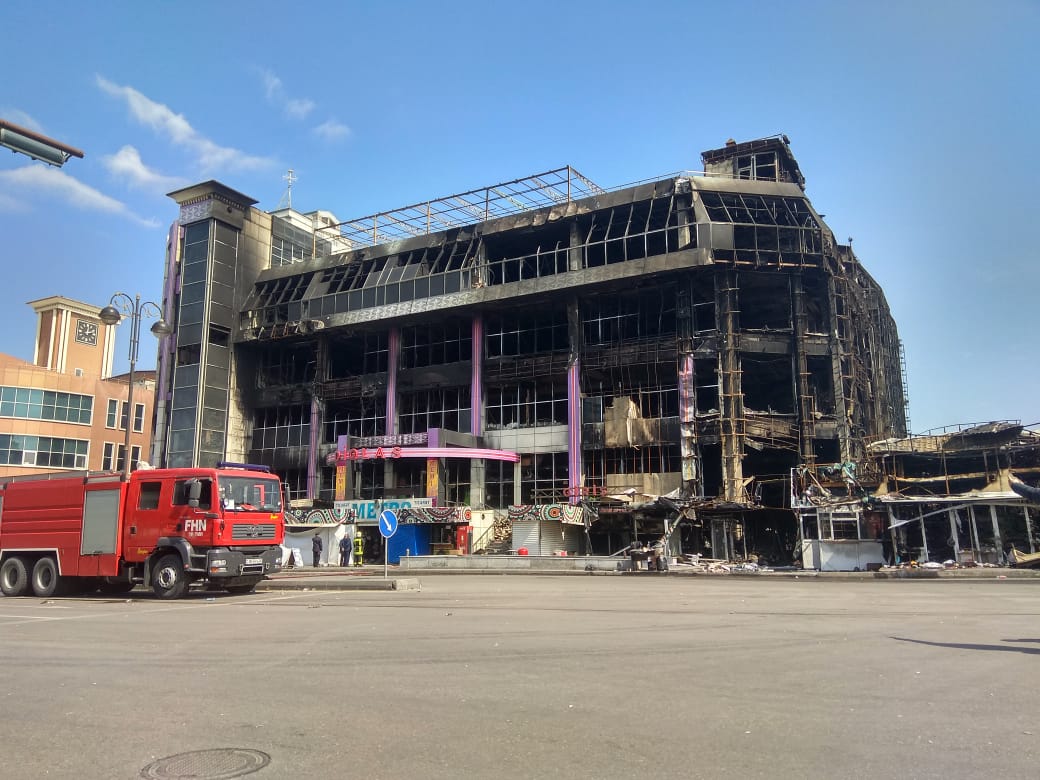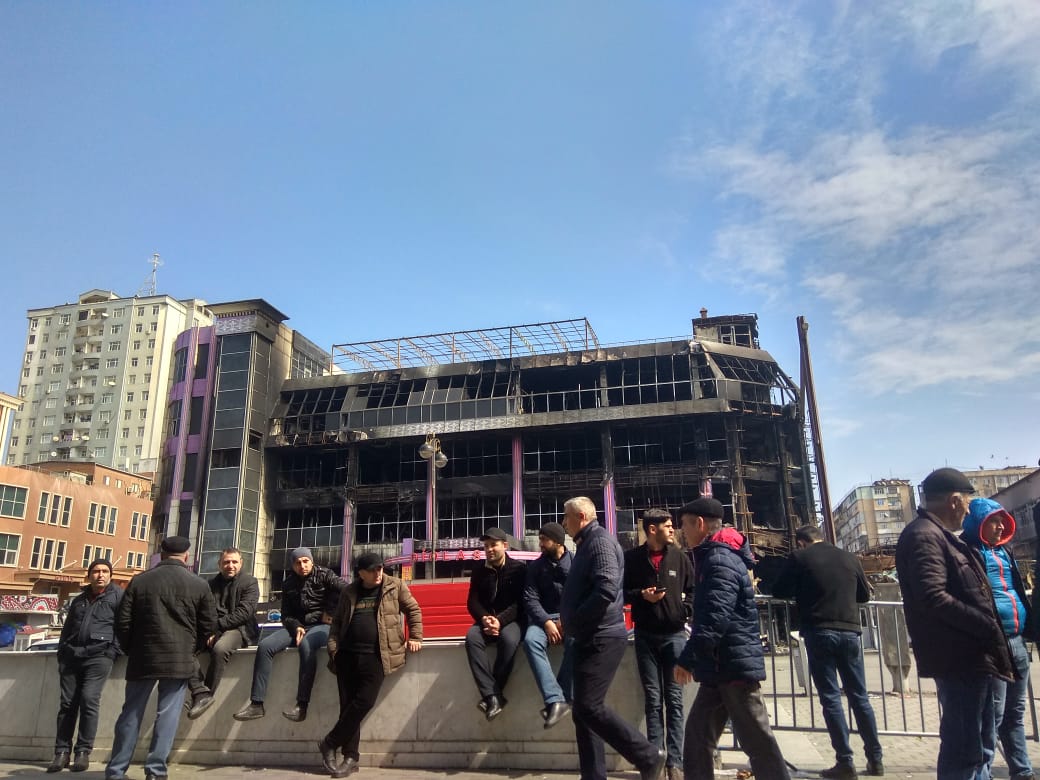

Dozens of shopkeepers in Baku have called for compensation after a fire devastated the city’s Diglas Shopping Centre, destroying their goods.
On 26 March, a fire engulfed the four-storey shopping centre in Baku’s Nizami District. The fire, which broke out in the morning, was extinguished that afternoon.
Owners of the hundreds of shops located within the mall were unable to remove their items.
On 27 March, Nizami District head Arif Gasimov met with shopkeepers and urged them to wait for the conclusion of an official investigation into the fire.
During the meeting, one shopkeeper said he had reached out to insurance companies to insure his products prior to the fire, but that the companies had refused.
That same day, the shopping centre’s management met with those who had lost products. The Director of the shopping centre, Araz Rahimov said they would meet with owners and negotiate to have the building repaired.
However, he stated that he would not be able to do anything about the goods lost in the fire, noting that they were not insured.
Rahimov promised that rent would not be collected while the building was being repaired.
Lack of insurance
Tunzala Dunyamaliyeva, who leases a shop for ₼660 ($390) a month selling wedding clothes, told OC Media that the centre’s management never told them to insure their product. She said she had lost ₼80,000 ($47,000) worth of goods in the fire.
‘For two days I have not been able to sleep. I have two children growing up without a father. I do not have a home; I live in a rental. Everything I gathered for 10 years was there’.
Dunyamaliyeva said the fire had completely bankrupted her, and that she no longer has money to buy basic necessities for her children.
‘I’ve paid [rent] every month for 10 years. I have repeatedly had to lay down my gold in a pawnshop. I sold my land and gave my rent’.
Dunyamaliyeva said that she and the other businesspeople who worked at the centre were in a hopeless situation.

‘They should at least give us some money so that we can buy goods that we can sell again, so that we are able to earn money. What are we to do now? Will we start begging?’
She said that most of her goods were bought on credit.
‘A week ago, I bought ₼13,000 ($7,600) worth of products. I also borrowed all of this money. How can I repay this debt now?’
Nizami Fatullayev, the owner of a clothing store in the shopping centre, told OC Media that he also paid a monthly rent of ₼660. He said he had lost products worth ₼61,000 ($36,000) — none of which were insured.
‘They don’t insure on the market. We also believed in the security of the market, because it is not an open field market. It never crossed our mind that something could happen.’
Fatullayev said that more than 3,000 people were working in the shopping centre. According to him, they must be compensated in order to restart their businesses.
‘Those who work here are poor. All of us rely on banks and work by taking debts. We want people to be compensated for the damage.’
Fatullayev said that when he starts to work again he will get insurance.
‘I don’t want to live with such stress again’.
Compensation ‘will be paid’
On 28 March, the Nizami District Executive Power held another meeting with the shopkeepers who lost goods in the fire. They were informed that President Ilham Aliyev and vice president Mehriban Aliyeva had decided to compensate them for the damage.
Deputy Head of the Nizami District Executive Power Yildirim Mehdiyev told local media that 420 people had lost goods in the fire. He added that a commission would be formed to determine the amount of damage, after which compensation would be transferred to the bank accounts of the victims.
Insurance expert and lawyer Khayal Mammadkhanli told OC Media that the lack of insurance of buildings in the shopping centre was a huge defect in the system. According to him, the body responsible for this is the Ministry of Emergency Situations.
‘Insurance companies, along with the Ministry of Emergency Situations, must work to ensure that the property is fully insured. But the vast majority of property owners in the country are insured for 10–20 times lower than their property’s value’.
‘Since property insurance is voluntary, and an attitude of: “I hope it will not happen” prevails, neglect by both the proprietor and individual entrepreneurs occurs’.
Mammadkhanli said that if shopkeepers did not have property insurance in their contract, this was a risk. He also added that insurance companies do not want to insure any products they know are at risk.
‘The most important thing for insurance companies is risk management. If there is no fire safety in a building and no safety standards are met […] no insurance company, as they are not a charity fund, will insure that risk, knowing that it will definitely be damaged’.
According to Mammadkhanli, another problem is in order to insure goods, a store must have official records of said goods.
‘The insurance company should be informed about the number of goods and import prices. But nobody can give them this information, because almost all of them are working informally. Because they cannot give this information to the insurance company, the insurance of these products is impossible’.
Mammadkhanli said that the government granting compensation was as a humane step, but a mistake.
‘Because they compensate for the irresponsibility of certain individuals through the state budget, these people continue to be negligent, they are even more confident’, Mammadkhanli said.
At a press conference on 28 March, President Aliyev said that insurance in Azerbaijan needed reform.
‘Usually, when such events occur in developed countries, the financial burden lies with insurance companies because all goods are insured. However, unfortunately, there are gaps in the insurance sector in Azerbaijan, and in many cases, we see that’, he said.






